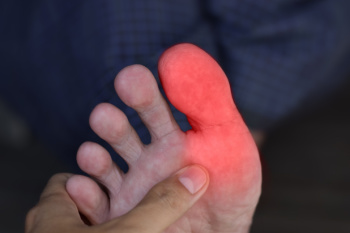
Hallux valgus and hallux rigidus are two different conditions affecting the big toe. Hallux valgus, commonly known as a bunion, is a deformity where the big toe deviates outward, causing the joint to protrude. It often results from wearing improper footwear, genetics, or arthritis, leading to pain, swelling, and difficulty wearing shoes. Hallux rigidus is a form of arthritis where the joint at the base of the big toe stiffens, limiting movement. Unlike hallux valgus, which involves deformity, hallux rigidus focuses on joint stiffness and decreased mobility. In terms of pain, both conditions can be quite painful, but hallux rigidus may be more limiting due to the loss of motion. Surgery may be required for either condition if conservative treatments do not provide relief or if the pain severely impacts daily activities. If you have pain in your big toe, it is suggested that you consult a podiatrist for a diagnosis and treatment that is deemed right for you.
Arthritis can be a difficult condition to live with. If you are seeking treatment, contact one of our podiatrists from Nashville Family Foot Care. Our practitioners can provide the care you need to keep you pain-free and on your feet.
Arthritic Foot Care
Arthritis is a term that is commonly used to describe joint pain. The condition itself can occur to anyone of any age, race, or gender, and there are over 100 types of it. Nevertheless, arthritis is more commonly found in women compared to men, and it is also more prevalent in those who are overweight. The causes of arthritis vary depending on which type of arthritis you have. Osteoarthritis for example, is often caused by injury, while rheumatoid arthritis is caused by a misdirected immune system.
Symptoms
- Swelling
- Pain
- Stiffness
- Decreased Range of Motion
Arthritic symptoms range in severity, and they may come and go. Some symptoms stay the same for several years but could potentially get worse with time. Severe cases of arthritis can prevent its sufferers from performing daily activities and make walking difficult.
Risk Factors
- Occupation – Occupations requiring repetitive knee movements have been linked to osteoarthritis
- Obesity – Excess weight can contribute to osteoarthritis development
- Infection – Microbial agents can infect the joints and trigger arthritis
- Joint Injuries – Damage to joints may lead to osteoarthritis
- Age – Risk increases with age
- Gender –Most types are more common in women
- Genetics – Arthritis can be hereditary
If you suspect your arthritis is affecting your feet, it is crucial that you see a podiatrist immediately. Your doctor will be able to address your specific case and help you decide which treatment method is best for you.
If you have any questions, please feel free to contact our office located in Nashville, TN . We offer the newest diagnostic and treatment technologies for all your foot care needs.
